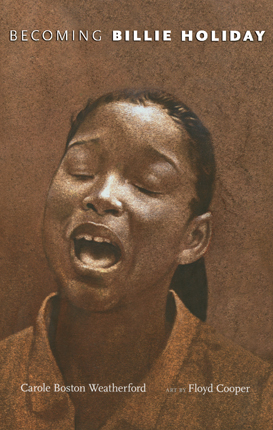Full Text Reviews: Booklist - 10/01/2008 In a series of free-verse poems and bluesy lyrics, headed by song titles, Weatherford retraces Holiday’s childhood and early career in the renowned jazz singer’s own voice. At eleven, I had the body / of a grown woman, / the mouth of a sailor, and a temper / hot enough to fry an egg. Growing up in Baltimore, she moved to Harlem with her sometimes-absent mother after being molested by a neighbor, and quickly fell in love with late-night life. Dubbed Lady Day, she earned money singing in clubs, was discovered by jazz-enthusiast John Hammond, and battled racism on a groundbreaking tour with Artie Shaw’s all-white band. Closing with Holiday’s spectacular headline gig at the Café Society, where she sang Strange Fruit—how could I not claim: / this is my song?—Weatherford leaves the 25-year-old at a high spot in her career, before later troubles and drug addiction. After the whole story readers will find a generous assortment of recommended reading and listening at the end of this proud, clear-voiced testimonial. - Copyright 2008 Booklist. School Library Journal - 10/01/2008 Gr 8 Up-In this fictionalized memoir, Weatherford has composed nearly 100 first-person narrative poems that detail Holiday's life from birth until age 25, the age at which she debuted her signature song, "Strange Fruit." The poems borrow their titles from Holiday's songs, a brilliant device that provides readers with a haunting built-in sound track. Weatherford's language is straightforward and accessible-almost conversational. She captures the woman's jazzy, candid voice so adroitly that at times the poems seem like they could have been lifted wholesale from Holiday's autobiography, Lady Sings the Blues. Cooper's sepia-toned, nostalgic, mixed-media illustrations provide an emotional counterpoint to the text. Resembling old photographs seen through a lens of aching hindsight, they make explicit the pain that Weatherford studiously avoids giving full voice to in her poems. Although Holiday's early life was one of relentless rejection, discrimination, and poverty, the author stays true to her subject and maintains a resolute and defiant tone, albeit one tinged with regret. Prostitution, rape, jail time, and violence are mentioned, but the book ends on the proverbial high note, before the singer's drug use, alcoholism, and early death. This captivating title places readers solidly into Holiday's world, and is suitable for independent reading as well as a variety of classroom uses.-Paula Willey, Baltimore County Public Library, Towson, MD Copyright 2008 Reed Business Information. - Copyright 2008 Publishers Weekly, Library Journal and/or School Library Journal used with permission. Loading...
|



